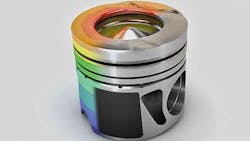Federal-Mogul Alloy Improves Piston Performance in Diesel Engines
Federal-Mogul Powertrain has developed a new cast aluminum alloy one it claims will increase the strength of pistons for high-performance diesel engines, supporting higher mechanical loads that will result in higher specific power and greater efficiency.
Specifically, the auto parts supplier said the DuraForm-G91 alloy would extend the performance life of diesel engine pistons by three to five times, compared to standard as-cast materials. It said the new composition increases fatigue strength in the high-temperature ranges typical for pistons of highly loaded diesel engines.
"The improved silicon and intermetallic morphology provides a microstructure with increased resistance to complex thermomechanical loading," according to Dr. Frank T.H. Dörnenburg, the group’s director of technology, Global Pistons, “while maintaining the required thermo-physical properties, such as expansion, density and thermal conductivity."
Federal-Mogul Powertrain said the new alloy makes it possible to design pistons with a lower compression height and reduced mass, the particular advantages of which will be a lower reciprocating mass. In turn, this will allow designers to adopt smaller, lighter cylinder blocks that will reduce CO2 emissions for the vehicles in which they are installed.
Development of the alloy and the new pistons was done at Federal-Mogul Powertrain’s Technical Center in Nuremberg, Germany, which is where the pistons are being manufactured currently. According to a Federal-Mogul source, some pistons have been delivered to unnamed customers for testing, but no start date for series production has been announced.
In addition to the material research and product design, the Nuremberg project involved “advanced testing techniques” that reportedly will shorten the validation period. "We have employed specially designed accelerated base engine tests combined with 'engine-like' rig testing procedures," according to Roman Morgenstern, a material development and characterization specialist. "Engine-like rig testing combines thermomechanical fatigue with high-cycle mechanical fatigue, which directly reflects the fatigue-critical load conditions seen by automotive diesel pistons in the engine."
"This is an example of the enabling technologies developed by Federal-Mogul Powertrain that help our customers to make each new engine generation more compact, lighter and with a smaller carbon footprint than its predecessor," stated Gian Maria Olivetti, chief technology officer, Federal-Mogul Powertrain. "With our materials scientists at the technological forefront of the industry, we are committed to developing advanced new concepts for both aluminum and steel-based pistons for diesel vehicles, offering perfect fit solutions for the various needs of our customers."
About the Author
Robert Brooks
Content Director
Robert Brooks has been a business-to-business reporter, writer, editor, and columnist for more than 20 years, specializing in the primary metal and basic manufacturing industries. His work has covered a wide range of topics, including process technology, resource development, material selection, product design, workforce development, and industrial market strategies, among others.
